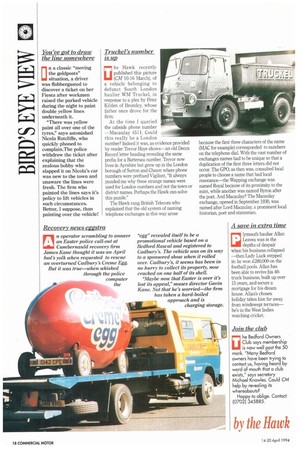Truckel's number is up
Page 24

If you've noticed an error in this article please click here to report it so we can fix it.
ahe Hawk recently published this picture (CM 10-16 March), of a vehicle belonging to defunct South London haulier WM Truckel, in response to a plea by Peter Kilden of Bromley, whose father once drove for the firm.
At the time I queried the cabside phone number —Macaulay 4511. Could this really be a London number? Indeed it was, as evidence provided by reader Trevor Haye shows—an old Decca Record letter heading revealing the same prefix for a Battersea number. Trevor now lives in Ayrshire but grew up in the London borough of Sutton and Cheam where phone numbers were prefixed Vigilant, "It always puzzled me why these strange names were used for London numbers and not the town or district names. Perhaps the Hawk can solve this puzzle."
The Hawk rang British Telecom who explained that the old system of naming telephone exchanges in this way arose because the first three characters of the name (MAC for example) corresponded to numbers on the telephone dial. With the vast number of exchanges names had to be unique so that a duplication of the first three letters did not occur. The GPO, as then was, consulted local people to choose a name that had local resonance—the Wapping exchange was named Royal because of its proximity to the mint, while another was named Byron after the poet. And Macaulay? The Macaulay exchange, opened in September 1930, was named after Lord Macaulay, a prominent local historian, poet and statesman.


























































































